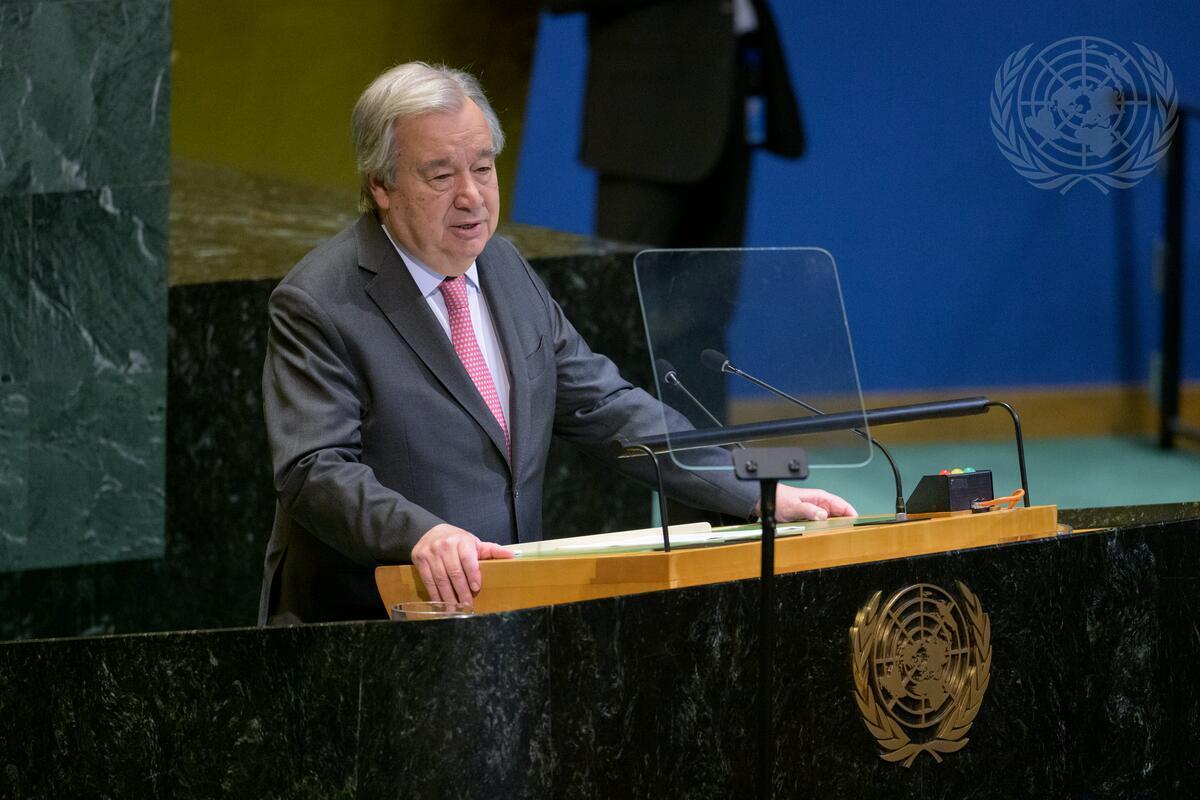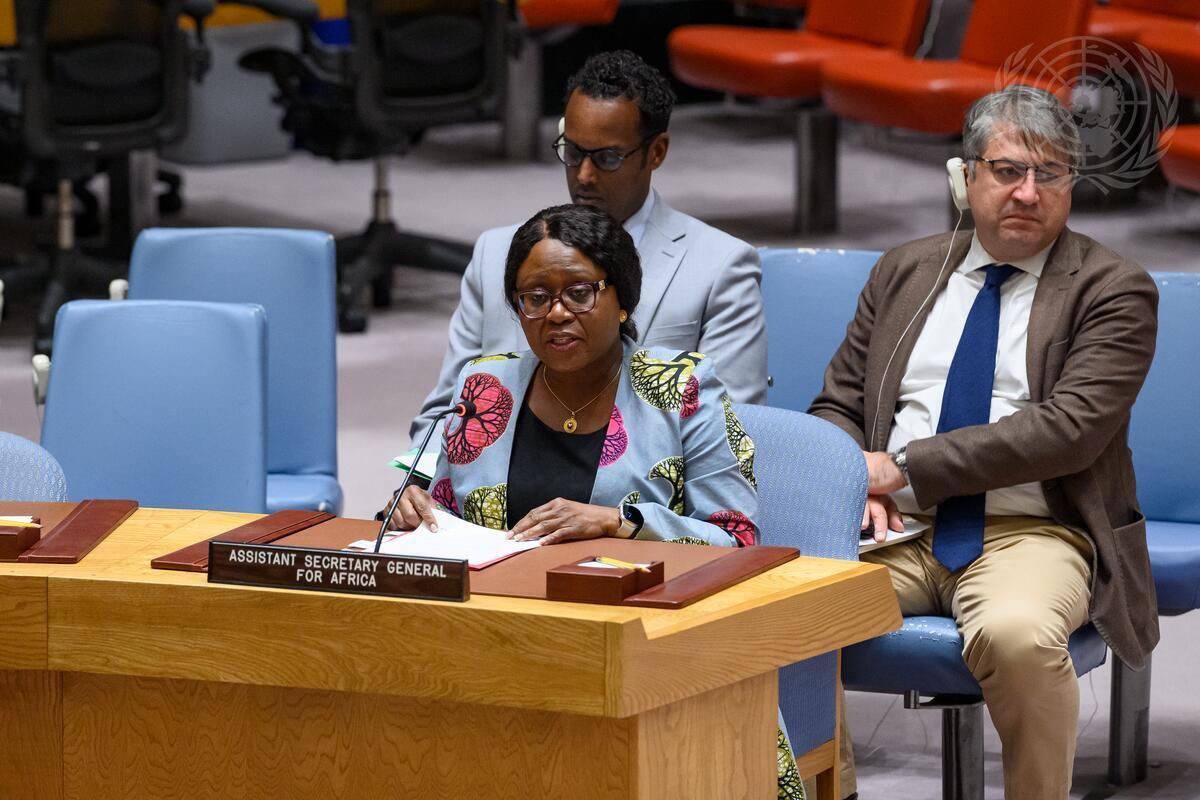Thank you, Madam President and thank you Secretary-General. I am grateful
for your words and for your support to us on the ground here.
Before I begin with my factual briefing, let me take this opportunity to pay
tribute to all the Sudanese women, men, and children, including United Nations
personnel and humanitarian workers, who have lost their lives or have been
injured in the fighting in Sudan.
Since I last briefed you on 17 April, my efforts, along with those of Member
States and regional organizations, have all focused on securing humanitarian
pauses or ceasefires between the Sudanese Armed Forces and the Rapid Support
Forces. These efforts have been met with limited success to date and the
situation on the ground has escalated dramatically.
In a positive step – the Secretary-General has just mentioned it – a 72-hour
ceasefire was brokered by the United States on 24 April. It seems to be holding
in some parts, so far. However, we also hear continuing reports of fighting and
movement of troops. The Sudanese Armed Forces and the Rapid Support Forces
have both accused one another of violating the ceasefire.
In Khartoum, fighting around the Republican Palace, Khartoum international
airport, the Army headquarters, RSF bases, and other strategic locations have
largely continued or in some cases intensified. Airstrikes and heavy shelling
have also continued, particularly in Bahri and Omdurman – the two partner cities around Khartoum. The Khartoum airport is reportedly now operational,
but its aprons are damaged.
Residential areas near the headquarters of the Army, RSF installations, and the
airport have come under persistent attacks. Homes, shops, schools, water and
electricity installations, mosques, hospitals, and other health facilities have been
damaged or are now fully destroyed. Reports of home invasions, looting of
homes and shops and cars at checkpoints have been rampant. These have
included the homes and the cars of Sudanese citizens, United Nations staff,
humanitarian workers, and the diplomatic community.
We have also received disturbing reports of attempted sexual assaults. With
supply lines running out and destroyed, fear of increased criminality is
mounting. Reports of prisoners being released from detention centers across
Khartoum have compounded these fears.
In the Northern State, the control of Merawi airport remains disputed. The
group of Egyptian forces captured by the RSF – which I briefed the Council on
last Monday – were safely handed over to Egypt.
The situation in Darfur remains volatile.
In North Darfur, thanks to a local ceasefire brokered by state authorities and the
native administration, with the support of the Permanent Ceasefire Committee
chaired by UNITAMS, the violence has decreased during the Eid al-Fitr period.
The ceasefire has been renewed and it still holds.
In West Darfur, however, in El Geneina particularly near the Chadian border,
fighting has resumed with increased and worrying reports of tribes arming themselves and joining the fight. Nyala in South Darfur continues to experience
fighting, although local initiatives aimed at dialogue have led to relative calm in
some localities.
In North Kordofan, there has been sporadic fighting in El Obeid. In Blue Nile,
intercommunal clashes erupted between Hausa and Funj communities in the
absence of security forces.
Other regions of Sudan, while spared from armed confrontation, are feeling the
impact of the fighting. Several are now hosting thousands of internally
displaced people, yet supply routes are disrupted resulting in fuel shortages.
Throughout Sudan, significant increases in the prices of basic commodities are
reported. There are also increasing reports of armed robbers at checkpoints on
some roads, looting civilians who are fleeing from violence.
Madam President,
The fighting in Sudan has created a humanitarian catastrophe with civilians
bearing its brunt.
As of this morning, at least 427 people have been killed and up to 4,000 injured.
These figures are conservative estimates, and they are climbing as the fighting
continues. The humanitarian situation will be covered by ASG Msuya in her
briefing so I will not go into further details.
Civil society and grassroots networks have mobilized to fill the response
vacuum. Several neighborhood resistance committees are providing basic
healthcare, or they are supporting the coordination of civilian evacuations from areas that have been hardest hit. In the midst of violence, the ordinary Sudanese
women and men continue to show the power of solidarity and compassion.
Excellencies,
Both of the warring parties have fought with disregard for the laws and norms
of war, attacking densely populated areas with little consideration for civilians,
for hospitals, or even for vehicles transferring the wounded and the sick.
I urge both sides to abide by their obligations under international humanitarian
law and ensure the protection of civilians and civilian infrastructure. Civilians
must be given safe passage to leave areas of active hostilities and they must be
allowed to access supplies.
The safety and security of United Nations personnel, premises, and assets, and
of humanitarian and medical workers must be ensured.
I have continued my regular contact with Generals Burhan and Hemedti to urge
them to stop the fighting and allow humanitarian pauses.
The Trilateral Mechanism and the Quad were able to negotiate humanitarian
pauses twice. Each of those pauses only held for a few hours.
On the occasion of Eid al-Fitr, with the support of the Secretary-General, we
were able to persuade Generals Burhan and Hemedti to commit to a three-day
pause, from 21 April.
This pause allowed some brief respite for Sudanese in parts of the capital and
country. It also enabled the United Nations and its humanitarian partners to
relocate its staff out of the immediate lines of fire.
However, the pause was not fully upheld, with attacks on headquarters, attempts
to gain ground, airstrikes, and explosions in different areas of the capital. In
contrast, locally brokered ceasefires in parts of Darfur and other regions are
holding, although they are tenuous.
The reports of mobilization by some tribes and some armed movements in
Darfur who are taking sides is dangerous, and it could draw in Sudan’s
neighboring countries. I renew my call on all communities to maintain their
neutrality and refrain from taking sides.
Excellencies, Members of this Council,
Both leaders have not been able to fully commit to a complete ceasefire or
implement one. The two generals continue trading accusations and issuing
competing claims of control over key installations. There is yet no unequivocal
sign that either is ready to seriously negotiate, suggesting that both think that
securing a military victory over the other is possible. This is a miscalculation.
As fighting continues, law and order will further break down throughout the
country, and command and control will dissipate. Sudan could become
increasingly fragmented, which would have a devastating impact on the region.
And even if one side wins, Sudan will lose.
Unfortunately, as we are not able to secure a sustained pause or ceasefire since
the start of fighting, the United Nations took the decision to evacuate and
relocate UN staff out of Khartoum, Darfur and elsewhere.
I speak to you today from Port Sudan where many of my colleagues and our
NGO partners arrived yesterday, on or with a UN convoy of nearly 1,200
people, including 744 United Nations staff and their dependents, INGO staff
and their dependents, and diplomatic staff from several embassies who were
relocated to Port Sudan from Khartoum. Today, this afternoon, I said farewell to
450 of them when they boarded a French frigate that will take them to Jeddah
through the night. The rest will be evacuated with commercial vessels in the
next two days. A few international staff and their dependents are still in
Khartoum and were not evacuated due to various reasons. We are also
continuing to ensure that our national staff can relocate as needed to safe areas.
Staff in West and Central Darfur have either evacuated or relocated. Other
relocations and evacuations are planned or ongoing. The evacuation of
personnel from El Fasher in North Darfur has not yet commenced but options
are being considered, with potential Member State support.
And let me say, I am immensely grateful to those Members States who are
helping facilitate these movements, and we rely on continued cooperation for
our remaining relocations and evacuations.
And let me be clear: our relocation and evacuation do not mean that the United
Nations is abandoning Sudan. We will continue to keep our presence in Sudan,
although reduced, and focus on the immediate priorities, in coordination with
our international partners. These priorities are: a sustained ceasefire with a
monitoring mechanism, a return to political negotiations, and the alleviation of
human suffering. On ceasefire, there is an initiative launched by the United States in close partnership with the Quad and with us in the Trilateral
Mechanism.
Excellencies,
The UN and our partners are doubling our efforts to ensure that the 72-hour
temporary ceasefire holds and evolves into a lasting cessation of hostilities and
return to political negotiations. Both military leaders must adhere to the
ceasefire and work toward its consolidation into a permanent cessation of
hostilities, facilitated by a mechanism. The United Nations is ready to support
this. I also call on Member States with influence on the warring parties to back
this.
Sudanese national figures including former Prime Minister Hamdok, business
leaders, political parties and civil society are mobilizing against the war and
urging support for a ceasefire and humanitarian support. I am coordinating
closely with them too.
Excellencies,
The courage and resilience of our Sudanese friends, national staff and partners
continues to motivate us. The entire UN family will work tirelessly towards
ending the violence in Sudan and restoring hope for a better future. The United
Nations’ commitment to Sudan and its people remains unwavering.
Thank you.






